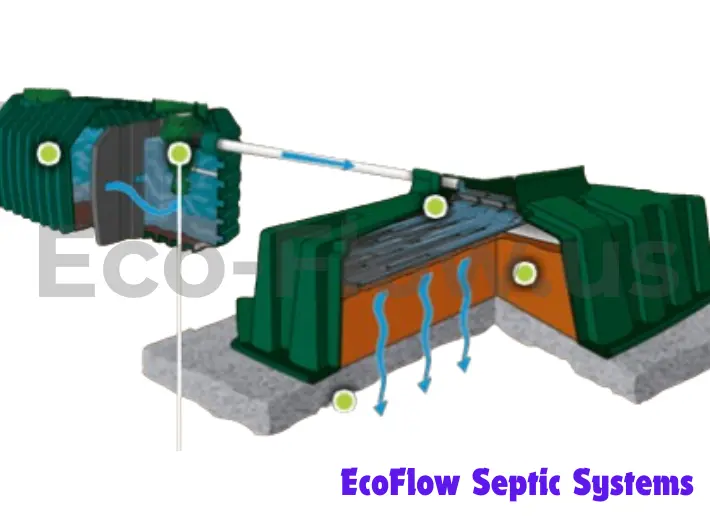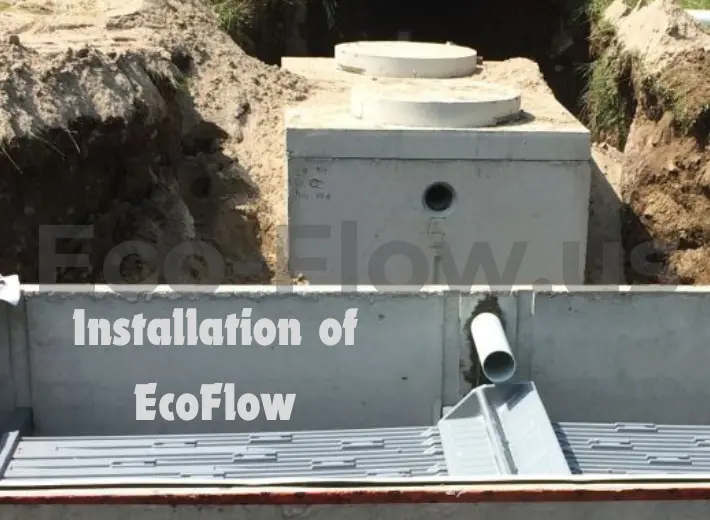In today’s environmentally conscious world, the demand for sustainable and efficient waste management solutions has never been higher. EcoFlow septic systems represent a cutting-edge approach to managing wastewater while minimizing environmental impact. This guide explores the various aspects of EcoFlow septic systems, including their benefits, functionality, installation, and maintenance.
Understanding EcoFlow Septic Systems
EcoFlow septic systems are designed to offer an environmentally friendly alternative to traditional septic systems.

They combine advanced technology with sustainable practices to manage household wastewater efficiently.
What is an EcoFlow Septic System?
An EcoFlow septic system is a modern wastewater treatment solution that integrates eco-friendly technologies to treat and dispose of household waste. Unlike traditional systems that rely solely on a septic tank and drain field, EcoFlow systems incorporate additional filtration and treatment processes to enhance performance and reduce environmental impact.
How Does an EcoFlow Septic System Work?
The EcoFlow system operates in several stages to ensure effective treatment of wastewater:
- Primary Treatment: Wastewater enters the septic tank where solids settle at the bottom and scum floats to the top. The liquid effluent in the middle is then directed to the next treatment stage.
- Secondary Treatment: In this stage, the liquid effluent is further treated using advanced filtration methods. This may include aerobic treatment, which introduces air into the wastewater to promote the breakdown of organic matter.
- Tertiary Treatment: The final stage involves additional purification processes, such as UV light disinfection or advanced filtration, to ensure that the treated water meets environmental standards before being released into the soil or water bodies.
Benefits of EcoFlow Septic Systems
EcoFlow septic systems offer several advantages over traditional septic systems, making them an attractive option for homeowners looking for sustainable waste management solutions.
Environmental Benefits
- Reduced Pollution: EcoFlow systems provide superior treatment, which significantly reduces the risk of pollutants entering groundwater or surface water.
- Efficient Water Use: The advanced treatment processes ensure that the treated water is of higher quality and can be safely reused or returned to the environment with minimal impact.
- Sustainable Design: These systems are designed with sustainability in mind, using eco-friendly materials and technologies that align with modern environmental standards.
Cost-Effectiveness
- Lower Maintenance Costs: The advanced filtration and treatment technologies in EcoFlow systems often result in lower maintenance requirements and reduced need for frequent pump-outs.
- Energy Efficiency: EcoFlow systems are designed to be energy-efficient, helping to lower operating costs compared to traditional septic systems.
Improved Performance
- Enhanced Treatment: The multi-stage treatment process ensures that wastewater is thoroughly treated, reducing the risk of system failure and increasing the longevity of the system.
- Better Odor Control: Advanced treatment processes help to minimize odors, providing a more pleasant environment for homeowners.
Installation of EcoFlow Septic Systems
Installing an EcoFlow septic system requires careful planning and professional expertise.

Here’s what you need to know about the installation process.
Site Assessment
Before installation, a thorough site assessment is essential to determine the suitability of the location for an EcoFlow septic system. Factors such as soil type, groundwater levels, and proximity to water bodies are evaluated to ensure optimal system performance.
System Design
The design of an EcoFlow septic system is tailored to meet the specific needs of the property. This includes selecting the appropriate size and type of system based on factors such as the number of occupants, water usage, and site conditions.
Installation Process
- Excavation: The installation site is excavated to accommodate the septic tank and any additional treatment units.
- Tank Placement: The septic tank and treatment units are installed according to the design specifications. Proper placement ensures that the system functions efficiently and meets regulatory requirements.
- Connection: The system is connected to the household plumbing, and the various components are integrated to ensure seamless operation.
- Testing: After installation, the system undergoes testing to verify its performance and ensure that it meets all environmental and regulatory standards.
Maintenance and Care for EcoFlow Septic Systems
Proper maintenance is crucial to ensuring the long-term performance and efficiency of EcoFlow septic systems. Here are some key maintenance tips.
Regular Inspections
- Routine Check-Ups: Schedule regular inspections by a professional to assess the condition of the system and identify any potential issues early.
- System Monitoring: Many EcoFlow systems come with monitoring features that allow homeowners to keep track of the system’s performance and detect any anomalies.
Waste Management Practices
- Avoid Flushing Non-Biodegradable Items: Do not flush items such as wipes, chemicals, or large food scraps, as they can clog the system and interfere with the treatment process.
- Minimize Chemical Use: Limit the use of harsh chemicals in household cleaning products, as they can disrupt the balance of beneficial bacteria in the septic system.
Pump-Out Schedule
- Regular Pumping: Even though EcoFlow systems require less frequent pump-outs than traditional systems, it’s still important to follow a regular pump-out schedule to maintain optimal performance.
Troubleshooting Common Issues
- Odor Problems: If you notice persistent odors, it may indicate a problem with the system or ventilation. Contact a professional to investigate and resolve the issue.
- Slow Drains: Slow draining fixtures may signal a problem with the system or plumbing. Regular maintenance and prompt attention can help prevent more serious issues.
Conclusion
EcoFlow septic systems offer an advanced and environmentally friendly solution for managing household wastewater. By combining cutting-edge technology with sustainable practices, these systems provide superior performance, cost-effectiveness, and environmental benefits. Proper installation and maintenance are essential to ensuring the long-term efficiency and effectiveness of your EcoFlow septic system.
Call to Action
If you’re considering upgrading to an EcoFlow septic system or need assistance with installation or maintenance, contact a professional service provider today. Investing in an EcoFlow system not only improves your waste management but also contributes to a healthier environment. For more information and to explore your options, reach out to local experts and take the first step towards a more sustainable future.
Frequently Asked Questions (FAQs)
1. What makes EcoFlow septic systems different from traditional systems?
EcoFlow septic systems incorporate advanced filtration and treatment technologies, offering superior wastewater management and environmental benefits compared to traditional systems.
2. How often do EcoFlow septic systems need to be pumped?
While EcoFlow systems typically require less frequent pump-outs than traditional systems, it’s important to follow a regular maintenance schedule recommended by the manufacturer or a professional.
3. Can I install an EcoFlow septic system myself?
Installation of an EcoFlow septic system should be conducted by a professional to ensure proper setup, compliance with regulations, and optimal performance.
4. What maintenance is required for an EcoFlow septic system?
Regular inspections, monitoring, and adherence to proper waste management practices are essential for maintaining an EcoFlow septic system. Follow the manufacturer’s guidelines for pump-out schedules and maintenance.
5. Are EcoFlow septic systems more expensive than traditional systems?
While the initial cost of an EcoFlow septic system may be higher, the long-term benefits, including lower maintenance costs and improved performance, can make it a cost-effective choice.
Looking for unbeatable deals on top-tier portable power solutions? Now is the perfect time to check out EcoFlow’s sale! EcoFlow offers cutting-edge power stations that are perfect for outdoor adventures, emergency preparedness, or everyday use.
From compact models for lightweight travel to high-capacity units for more demanding needs, EcoFlow’s lineup has something for everyone. Their products are known for rapid charging, long-lasting performance, and user-friendly designs.
During this sale, you can enjoy significant discounts on a range of models, making it easier than ever to upgrade your power setup. Don’t miss this opportunity to invest in reliable, innovative power solutions at a fraction of the cost.
Power up your adventures or safeguard your home with EcoFlow’s exceptional products. Explore the sale now and find the perfect solution for your needs at EcoFlow Sale.
